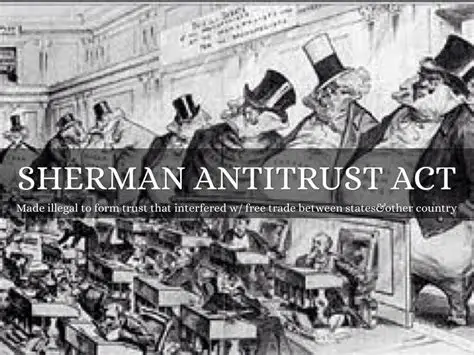Introduction
The Sherman Antitrust Act, enacted in 1890, is a landmark piece of legislation that has shaped the landscape of American antitrust law for over a century. This act aims to prevent the formation of monopolies and cartels and to promote fair competition in the marketplace.

Key Provisions
The Sherman Antitrust Act consists of two main sections:
- Section 1: Prohibits agreements or conspiracies that unreasonably restrain trade or commerce.
- Section 2: Prohibits monopolization and attempted monopolization.
Historical Context
The late 19th century witnessed a surge in corporate mergers and consolidations, leading to the formation of powerful trusts and cartels. These entities gained significant market control, stifled competition, and raised prices for consumers.
The Sherman Antitrust Act was passed as a response to these concerns, aiming to restore economic fairness and protect the interests of small businesses and consumers.
Impact on Competition
The Sherman Antitrust Act has had a profound impact on competition in the United States. It has:
- Broken up large monopolies: Notable examples include Standard Oil in 1911 and AT&T in 1984.
- Prevented the formation of new cartels: Firms are hesitant to engage in collusive behaviors that could violate the act.
- Promoted innovation: Competition incentivizes businesses to develop new products and services to attract customers.
Enforcement
The Sherman Antitrust Act is enforced by the Department of Justice (DOJ) and the Federal Trade Commission (FTC). The DOJ handles criminal cases, while the FTC enforces civil cases.
Companies that violate the act may face penalties, including fines, prison sentences, and divestitures.
Notable Cases
Landmark cases that have tested the scope of the Sherman Antitrust Act include:
- Standard Oil Co. v. United States (1911): The Supreme Court upheld the government’s antitrust lawsuit and ordered the breakup of Standard Oil.
- United States v. Microsoft Corp. (2000): Microsoft was found to have engaged in anti-competitive practices and was ordered to split into two companies.
- AT&T Corp. v. MCI Communications Corp. (1994): AT&T was forced to break up its long-distance telephone business from its local telephone operations.
Limitations
Despite its effectiveness, the Sherman Antitrust Act has limitations:
- Size alone is not illegal: Companies can grow large through legitimate business practices, without violating the act.
- Enforcement challenges: Proving anti-competitive behavior can be time-consuming and resource-intensive.
- Exemptions: Certain industries, such as health care and utilities, may be exempt from some provisions of the act.
Tables
Table 1: Key Provisions of the Sherman Antitrust Act
| Section | Prohibition |
|---|---|
| Section 1 | Agreements or conspiracies that unreasonably restrain trade |
| Section 2 | Monopolization and attempted monopolization |
Table 2: Notable Sherman Antitrust Act Cases
| Case | Year | Outcome |
|---|---|---|
| Standard Oil Co. v. United States | 1911 | Breakup of Standard Oil |
| United States v. Microsoft Corp. | 2000 | Split of Microsoft into two companies |
| AT&T Corp. v. MCI Communications Corp. | 1994 | Breakup of AT&T’s long-distance telephone business |
Table 3: Benefits of the Sherman Antitrust Act
| Benefit | Description |
|---|---|
| Promotes competition | Encourages businesses to compete fairly |
| Protects consumers | Prevents monopolies from charging excessive prices |
| Stimulates innovation | Incentivizes businesses to develop new products and services |
Table 4: Challenges of Enforcing the Sherman Antitrust Act
| Challenge | Description |
|---|---|
| Size alone is not illegal | Companies can grow large without violating the act |
| Enforcement challenges | Difficult to prove anti-competitive behavior |
| Exemptions | Certain industries may be exempt from some provisions |
FAQs
1. What is the purpose of the Sherman Antitrust Act?
To prevent monopolies and cartels and promote fair competition.
2. Who enforces the Sherman Antitrust Act?
The Department of Justice and the Federal Trade Commission.
3. What are the penalties for violating the Sherman Antitrust Act?
Fines, prison sentences, and divestitures.
4. Can large companies be legal under the Sherman Antitrust Act?
Yes, if they have not engaged in anti-competitive practices.
5. What are the limitations of the Sherman Antitrust Act?
It does not apply to all industries and can be difficult to enforce.
6. How has the Sherman Antitrust Act impacted the US economy?
It has promoted competition, protected consumers, and stimulated innovation.
